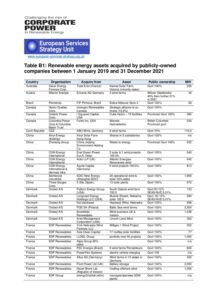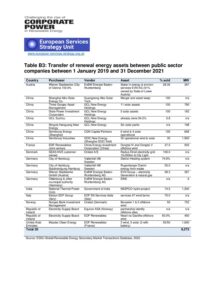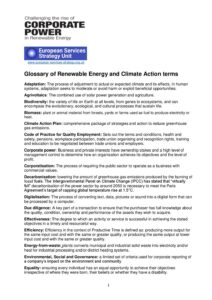New book by Dexter Whitfield, Spokesman Books – https://spokesmanbooks.org/
(paperback £18.00, ePub £10.00)
Contents
Crisis and opportunities – Corporate domination – Trading renewable energy assets – Tax havens and market interventions – Public ownership and public values – Wide use of PPPs for renewable energy projects in emerging economies – The commodification and marketisation of nature and biodiversity – Equalities – economic, social and environmental justice – Economic and industrial strategies – Strategic opportunities
See also https://www.european-services-strategy.org.uk/publications/books-and-articles-by-dexter-whitfield

HELEN MERCER highly recommends an invaluable guide to the state of private ownership of renewable energy, and what to do about it
The great green scam
DEXTER WHITFIELD has performed an invaluable service over the years in researching the mechanism of corporate control over public services and its extremely profitable but socially disastrous effects. He has written widely on creating “a public alternative to the privatisation of life.”
Here he turns his attention to the provision of renewable energy.
Painstaking research into annual reports, company press releases and corporate bulletins shows that globally the private sector provides 86 per cent of the capital investment required: public-sector involvement is insignificant except for facilitating this private investment through public/private partnerships.
Private equity companies such as BlackRock “have carved out a pivotal role financing and owning renewable energy projects”; pension funds also play a significant role.
A sample of 20 private renewable energy companies paid dividends between 2019 and 2021 of £10.7 billion. And of course, among such stakeholders, there is widespread use of tax havens.
He exposes how private companies have used environment, social and governance benchmarks to greenwash their activities and to exaggerate the benefits of private-sector involvement.
Similarly, he exposes the parallel marketisation of nature and biodiversity, paraded as a means to value natural resources with a view to their conservation, but actually turning “ecosystem services” into financial assets which can be traded in a market with an estimated value of $120 trillion per year.
Having laid out the ongoing capture of environmental policies by the private sector and by neoliberal economics, in the second part Whitfield considers how this dominance is to be challenged and what national and international strategies are needed for the transition of human economies to renewables.
Prominent among these recommendations is a radical increase in public ownership so that “all public financial support must be conditional on binding agreements that give the public sector the first option to acquire full ownership of a project in any sale.”
A new agency, a national renewable energy agency, is needed to increase direct public investment and nationalise key companies.
Other forms of government influence and direction of the sector are needed in order to, for example, strengthen national grid networks, and promote the decarbonisation of agriculture, transport and construction.
Government activities, he emphasises, should be bound by frameworks for assessing the impact of policies on aspects of social and economic justice.
Whitfield has tackled a huge topic and the size of the challenge is well-illustrated in the ideas being discussed by the PCS for a national climate service.
His research and prescriptions will help to inform future debate.
Additional data
ESSU Global Renewable Energy Secondary Market Database 2019-2021
Table B1: Renewable energy assets acquired by publicly-owned companies between 1 January 2019 and 31 December 2021
Table B2: Publicly-owned assets sold to private sector between 1 January 2019 and 31 December 2021
Table B3: Transfer of renewal energy assets between public sector companies between 1 January 2019 and 31 December 2021
Glossary of Renewable Energy Terms





